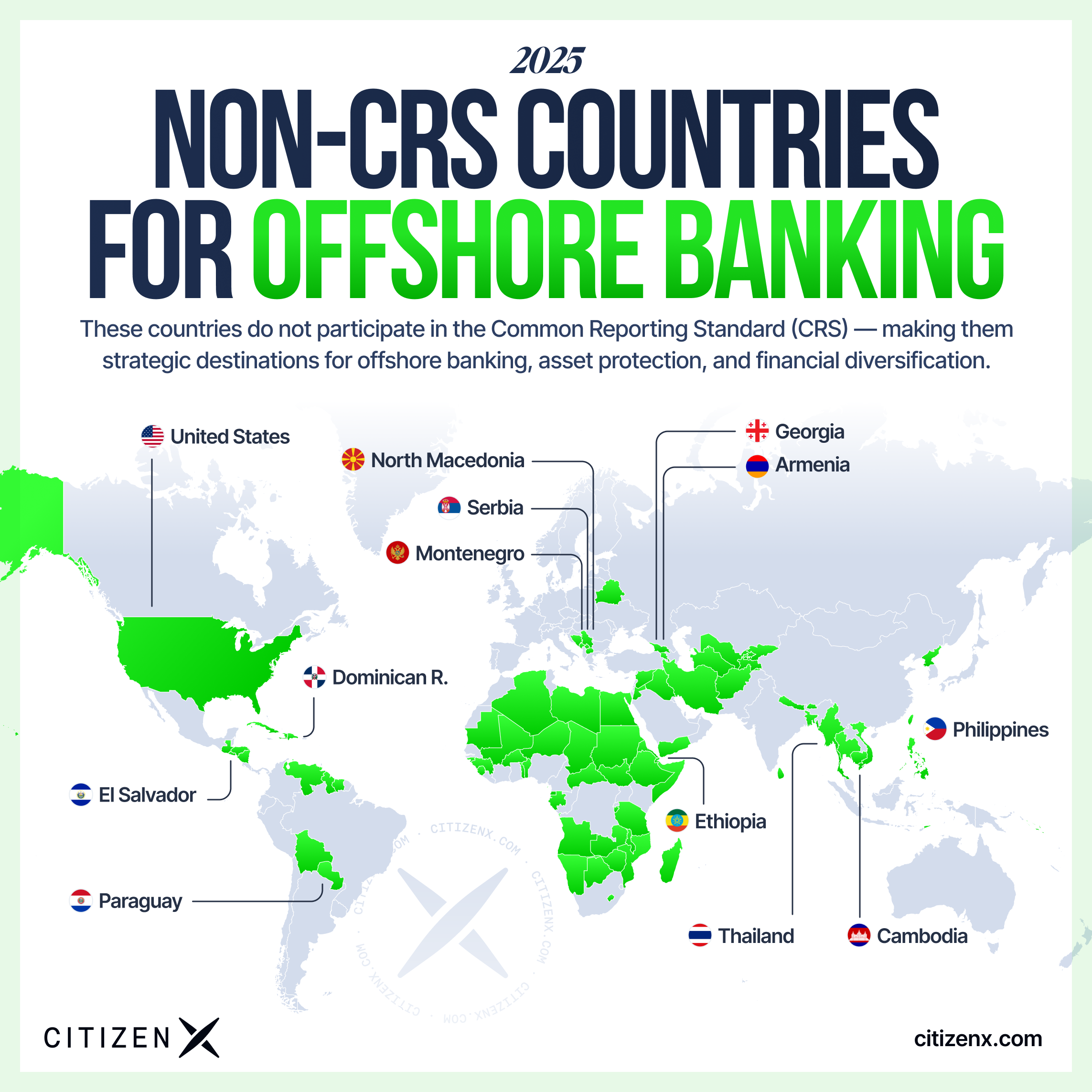Banks asking about your tax residency used to be rare. Now it's the first question on every expat's tax form. This shift happened because of one regulation: the Common Reporting Standard (CRS), which fundamentally changed how financial institutions handle customer information worldwide.
While 120+ countries now participate in the automatic exchange of information through CRS, several key offshore jurisdictions have chosen a different path. Even major banks like HSBC must comply with these strict reporting requirements in traditional banking destinations like Spain, — making non-CRS countries increasingly valuable for investors seeking privacy.

The old playbook for financial privacy - Swiss numbered accounts and Caribbean tax havens like Nevis - has largely disappeared. But the legitimate need for banking privacy hasn't vanished with it.
Instead, sophisticated investors now focus on jurisdictions that combine low taxes with robust privacy protections, often integrating residence permits and real estate investments into their wealth preservation strategy.
Why Banking Privacy Matters: Understanding Common Reporting Standards
Think of CRS as a global network where banks act as information collectors for tax authorities. Created by the OECD, this system requires banks to gather detailed financial information about foreign account holders and automatically share it with participating countries. The impact extends beyond personal accounts to offshore companies and their banking relationships.

How CRS Changed Everything
Your bank now serves two masters: you and the tax authorities. When you open an account in a CRS jurisdiction, the bank must:
- Track your tax residency
- Monitor your account activity
- Report your balances and transactions
- Share this data with multiple governments
- Keep extensive records for compliance checks
This has made traditional financial privacy strategies obsolete while creating new challenges for legitimate wealth protection. Smart investors now seek banking destinations that understand both privacy needs and tax laws.

FATCA: America's Special Rules
U.S. citizens face extra complexity because of FATCA (Foreign Account Tax Compliance Act). Unlike CRS, FATCA is a one-way street - foreign banks must report on U.S. account holders, but the U.S. rarely shares data in return.
This asymmetry has unexpectedly made the United States itself a privacy haven for non-U.S. persons, attracting wealth from traditional offshore jurisdictions.
Privacy vs Secrecy: What's Actually Important
Smart banking privacy isn't about hiding money - it's about protecting it. Modern non-CRS banking prioritizes:
- Keeping your data secure from breaches
- Protecting against identity theft
- Diversifying political risk
- Maintaining legitimate privacy rights
- Following all relevant laws
The goal is protection, not concealment. Your wealth deserves the same privacy as any other personal information, whether it's held in personal accounts or through offshore company structures.
Banking and Multiple Passports
Look at most successful global citizens - they typically hold multiple passports and bank accounts across different jurisdictions. This isn't coincidence. Non-CRS jurisdictions often integrate perfectly with citizenship planning by offering:
- Better asset protection options
- Multi-currency accounts
- Political risk diversification
- Strategic tax planning opportunities
- Enhanced financial sovereignty

Why Smart Money Chooses Non-CRS Banking Jurisdictions
Your money deserves options. Just as you wouldn't keep all your investments in one stock, keeping all your wealth in CRS-reporting countries creates unnecessary risk. Here's what makes non-CRS jurisdictions essential for serious wealth protection in 2024.
Asset Protection That Actually Works
Most asset protection strategies fall apart under pressure. Non-CRS jurisdictions offer real protection because they maintain genuine legal barriers against foreign claims. This is also why many high-net-worth individuals evaluate secondary citizenship routes like Paraguay Citizenship when designing long-term asset-protection plans. Forget complex trust structures and expensive shell companies - sometimes geographical distance plus solid banking privacy laws work better than elaborate legal frameworks.
The key protections you gain in non-CRS jurisdictions include:
- Protection from frivolous lawsuits and creditor claims
- Barriers against political instability in your home country
- Safeguards from currency controls and bank failures
- Defense against excessive taxation attempts
- Legal frameworks that respect financial privacy
Financial Privacy Without The Shadiness
Privacy matters. Not because you're hiding anything, but because your financial information is valuable and vulnerable. While CRS jurisdictions freely share your data across borders, non-CRS banks still maintain meaningful privacy protections. This matters more than ever in an age of identity theft, corporate espionage, and sophisticated financial scams.
Think about it: you'd never post your bank statements online. Yet CRS means dozens of tax authorities freely share your financial details. Non-CRS jurisdictions give you back control over who sees your financial information and when.

Currency Options That Make Sense
CRS jurisdictions typically push you toward their local currency, limiting your financial flexibility. Non-CRS banks take a different approach. They understand global citizens need true multi-currency capabilities. This means better exchange rates, seamless international transfers, and access to both major and emerging currency pairs - all without excessive fees or bureaucratic hurdles.
When the next currency crisis hits, having accounts outside affected networks could preserve your wealth. Non-CRS jurisdictions typically offer more currency flexibility precisely because they're not bound by the same international reporting requirements.
Beyond Basic Risk Management
While standard risk management focuses on markets and investments, banking jurisdiction risk demands equal attention. Non-CRS countries help you handle threats that traditional financial planning often overlooks. Political shifts, economic sanctions, banking system failures - these risks become manageable when your wealth isn't trapped in one banking system.
The 2008 financial crisis taught us that even "stable" banking systems can fail. Cyprus showed how quickly governments can freeze accounts. Argentina demonstrated how currency controls can trap wealth. Non-CRS jurisdictions offer protection against these scenarios by keeping your assets outside vulnerable networks.
Perfect Fit With Multiple Citizenships
Each new passport should open banking doors. The ideal banking setup for international citizens includes:
- Primary accounts in major financial centers
- Strategic accounts in non-CRS jurisdictions
- Banking relationships that complement your passport portfolio
- Access to both emerging and established markets
- Options for citizenship-linked banking services
The best wealth protection combines strong passports with strategic banking choices. Non-CRS jurisdictions make this easier by offering citizenship-linked banking services and supporting complex international lifestyles. They recognize that modern wealth isn't bound by borders - and neither should your banking options be.
Armenia: Emerging Banking Haven at the Crossroads of Europe and Asia

Banking System Overview
Armenia's banking sector combines Eastern European efficiency with modern financial infrastructure. Leading institutions like Ameriabank and Evoca Bank offer sophisticated digital platforms while maintaining strong privacy protections. The banking system has shown remarkable stability, with stringent capital requirements and a conservative lending approach protecting depositor interests.
International banks maintain a growing presence, though local powerhouses dominate the market. Most major banks offer private banking services with English-speaking relationship managers and modern online banking platforms that rival Western standards.
Cost of Living
Armenia offers an exceptionally high quality of life at reasonable costs, particularly in the capital Yerevan. A luxury three-bedroom apartment in the city center typically costs $800-1,200 monthly. Fine dining experiences range from $15-50 per person, while high-end healthcare services cost roughly 20% of Western prices. Private international schools charge $5,000-8,000 annually, making it an attractive destination for families.
Tax Rates
Armenia maintains a straightforward tax system with competitive rates. Personal income tax follows a flat 22% rate, while corporate profits face a 20% tax. Capital gains from securities receive preferential treatment at 10%, and there's no wealth tax. The country holds double taxation agreements with 46 nations, simplifying international tax planning.
Currency
The Armenian Dram (AMD) maintains relative stability against major currencies. Banks commonly offer accounts in AMD, USD, EUR, and RUB. Multi-currency accounts come standard with most private banking relationships, and foreign currency transactions face minimal restrictions. Interest rates on AMD deposits often exceed 9% annually, while USD deposits typically earn 3-4%.
Ease of Opening a Bank Account
Opening an account requires about two weeks and standard documentation: passport, proof of address, and source of funds declaration. Several banks now offer remote initiation of the process, though final signatures typically require in-person visits. Minimum deposits for premium accounts start around $50,000, with some banks requiring $100,000 for full private banking services.
Geography and Airports
Positioned at the crossroads of Europe and Asia, Armenia offers excellent connectivity. Zvartnots International Airport (EVN) in Yerevan provides direct flights to major European and Middle Eastern hubs. The country's location enables easy access to both Western financial centers and Asian markets, with Dubai reachable in under 3 hours and Paris in 4.5 hours.
Philippines: Strategic Pacific Banking Center with Strong Privacy Traditions

Banking System Overview
The Philippine banking sector combines robust local institutions like Metrobank with established international players. The system maintains strong privacy protections while offering modern services. Digital banking has seen rapid advancement, with major banks investing heavily in fintech solutions and mobile banking platforms.
Unlike many Asian nations, the Philippines maintains significant banking independence, particularly regarding information sharing. This creates unique opportunities for privacy-focused banking while maintaining high service standards.
Cost of Living
Major cities like Manila and Cebu offer first-world amenities at moderate costs. Luxury condominiums in prime areas range from $1,500-2,500 monthly. High-end restaurants typically charge $30-60 per person, while top-tier healthcare remains affordable at roughly 30% of U.S. prices. International schools cost $8,000-15,000 annually.
Tax Rates
Foreign-sourced income generally faces minimal taxation in the Philippines. Local income encounters progressive rates up to 35%. Corporate tax recently dropped to 25%, with special rates for smaller enterprises. Capital gains see varied treatment: stocks traded on the Philippine Stock Exchange incur 6% tax on gross sales, while other capital gains face 15%.
Currency
The Philippine Peso (PHP) trades freely, and banks readily offer USD accounts. Major banks provide multi-currency options including EUR, JPY, and major Asian currencies. Foreign currency transactions face few restrictions, though large transactions require standard documentation. USD deposits typically earn 1-2% annually, while peso deposits can yield 3-4%.
Ease of Opening a Bank Account
Account opening procedures vary significantly between banks. Premium accounts typically require:
- Two weeks for approval
- Passport and secondary ID
- Proof of address
- Reference letter from existing bank Minimum deposits range from $10,000-50,000 for premium services, with some banks offering remote initial applications.
Geography and Airports
The Philippines' strategic Pacific location offers excellent regional connectivity. Manila's Ninoy Aquino International Airport (MNL) serves as a major hub, with direct flights throughout Asia and to key Western destinations. Clark International Airport provides an excellent alternative, especially for access to North Asian financial centers.
Cambodia: Southeast Asia's Rising Banking Center
Banking System Overview

Cambodia's banking sector has transformed dramatically in recent years. Major Malaysian banks operate alongside strong local institutions, while Western banks maintain growing operations. The National Bank of Cambodia has modernized regulatory frameworks without sacrificing privacy protections. Unlike regional neighbors, Cambodia maintains significant banking independence and privacy traditions.
Digital banking adoption rates exceed regional averages, with institutions like ABA Bank and Prince Bank offering sophisticated mobile platforms. Most major banks provide relationship managers fluent in English and Mandarin.
Cost of Living
Cambodia offers exceptional value, particularly in Phnom Penh. Luxury apartments in prime areas cost $1,000-2,000 monthly. Fine dining ranges from $20-40 per person, while top-tier international schools charge $12,000-18,000 annually. Private healthcare at international-standard facilities costs roughly 40% of comparable U.S. prices.
Tax Rates
Cambodia provides an attractive tax environment. Resident individuals face a progressive tax rate up to 20%. Corporate tax stands at 20%, with incentives available for priority sectors. No capital gains tax exists, though this may change with pending legislation. The country maintains limited tax treaties, which actually enhances privacy for many investors.
Currency
The Cambodian Riel (KHR) circulates alongside the US Dollar, with most banking conducted in USD. This natural dollarization provides stability and simplifies international transactions. Banks offer accounts in USD, KHR, and major regional currencies. USD deposits typically earn 3-4% annually, with fixed-term deposits reaching 6-7%.
Ease of Opening a Bank Account
Account opening remains straightforward compared to most Asian financial centers. Requirements include:
- Valid passport
- Local phone number
- Proof of address (local or foreign)
- Initial deposit (varies by bank)
- Processing typically takes 1-2 days, with some banks offering same-day account opening for premium clients.
Geography and Airports
Phnom Penh International Airport (PNH) connects directly to major Asian hubs. The country's position in the heart of Southeast Asia enables easy access to Singapore, Hong Kong, and Bangkok. Most regional financial centers lie within a 2-3 hour flight radius.
North Macedonia: Europe's Hidden Banking Haven
Banking System Overview

North Macedonia's banking sector combines European standards with greater privacy flexibility. Major players include Komercijalna Banka and Stopanska Banka, alongside European banking groups like Société Générale. The system maintains strong capital ratios while offering more privacy than EU jurisdictions.
Digital infrastructure meets European standards, with most banks offering comprehensive online and mobile services. Private banking services typically include multi-lingual support.
Cost of Living
North Macedonia offers European living standards at a fraction of EU prices. Premium apartments in Skopje's best districts cost $500-800 monthly. High-end restaurants charge $25-40 per person. Private healthcare costs roughly 30% of Western European rates. International schools charge $8,000-12,000 annually.
Tax Rates
The tax system favors international investors. Personal income tax follows a flat 10% rate. Corporate tax matches at 10%, one of Europe's most competitive rates. No withholding tax applies to dividend payments to non-residents. Capital gains face 10% tax, with exemptions available through proper structuring.
Currency
The Macedonian Denar (MKD) maintains stability through informal Euro pegging. Banks routinely offer accounts in MKD, EUR, and USD. Currency controls remain minimal, with free conversion and transfer rights. Interest rates typically exceed Eurozone levels, particularly for Denar deposits.
Ease of Opening a Bank Account
Account opening requires moderate documentation but moves efficiently. Expect 1-2 weeks for approval with:
- Notarized passport copy
- Proof of income
- Bank reference letter
- Local address (can be corporate service provider)
Geography and Airports
Skopje International Airport (SKP) provides connections throughout Europe. The country's location offers easy access to both EU financial centers and Middle Eastern hubs. Most European capitals lie within a 2-3 hour flight radius.
Montenegro: Coastal Haven with Strong Privacy Protection
Banking System Overview

Montenegro's banking sector combines elements of Swiss-style privacy with Mediterranean accessibility. Leading institutions include CKB and Erste Bank, offering sophisticated services while maintaining strong privacy protections. The system operates independently of EU banking networks while maintaining high standards.
Private banking services target international clients, with relationship managers speaking multiple languages and banks offering concierge-style services.
Cost of Living
Montenegro delivers luxury living at reasonable costs. Premium seaside apartments range from $1,000-2,000 monthly. Fine dining in Porto Montenegro or Budva costs $50-100 per person. Private healthcare through international clinics costs 40% of Western European rates. Quality private schools charge $10,000-15,000 annually.
Tax Rates
Montenegro's tax regime attracts international wealth. Personal income tax follows a flat 9% rate. Corporate tax matches at 9%, making it one of Europe's most competitive jurisdictions. No wealth tax exists, and certain investment structures can reduce effective rates further. Capital gains face 9% tax, with numerous exemptions available.
Currency
Montenegro uses the Euro without being part of the Eurozone, creating unique advantages. Banks offer accounts in EUR and USD as standard. This unofficial euroization provides stability while keeping banking operations outside ECB oversight. Foreign currency transactions face minimal restrictions.
Ease of Opening a Bank Account
Account opening combines efficiency with thorough verification:
- Processing typically takes 1-2 weeks
- Passport and proof of address required
- Source of funds documentation needed
- Some banks accept remote applications with local representative Minimum deposits for premium services start around €50,000.
Geography and Airports
Tivat Airport (TIV) serves the coastal region with direct flights to major European cities. Podgorica Airport (TGD) provides additional connections. The country's position offers easy access to both European and Middle Eastern financial centers, with most major hubs reachable within 3 hours.
Dominican Republic: Caribbean Banking with North American Standards

Banking System Overview
The Dominican banking sector stands out in the Caribbean for its blend of privacy and accessibility. Scotiabank maintains significant operations here, while strong local banks like Banco Popular Dominicano and Banco BHD León offer sophisticated services. Unlike many Caribbean jurisdictions, the Dominican Republic maintains independence from CRS while implementing robust anti-money laundering standards.
Private banking services cater to North American and European clients, with relationship managers fluent in English and Spanish. Digital banking infrastructure has seen substantial investment, particularly in mobile banking platforms.
Cost of Living
The Dominican Republic offers Caribbean luxury at reasonable prices. Premium apartments in Punta Cana or Santo Domingo range from $1,200-2,500 monthly. High-end dining costs $40-80 per person. Private healthcare at international clinics runs about 50% of U.S. rates. International schools charge $8,000-15,000 annually.
Tax Rates
The tax system favors international residents. Foreign-source income faces minimal taxation. Local income encounters progressive rates up to 25%. Corporate tax stands at 27%, with substantial incentives for international businesses. No wealth tax exists, and property taxes remain minimal.
Currency
The Dominican Peso (DOP) trades freely, with USD widely accepted throughout the country. Banks routinely offer accounts in both currencies. USD deposits typically yield 2-3% annually, while peso accounts can earn significantly more. Foreign currency transactions face few restrictions beyond standard documentation.
Ease of Opening a Bank Account
Bank account opening typically requires:
- Valid passport
- Local address (can be property management company)
- Bank reference letter
- Initial deposit varying by bank
- Processing usually takes 1-2 weeks, with some banks offering expedited service for premium clients.
Geography and Airports
Punta Cana International Airport (PUJ) and Santo Domingo's Las Américas International Airport (SDQ) offer extensive connections throughout the Americas and Europe. The country's location provides easy access to both North American and Latin American financial centers.
Serbia: Emerging European Financial Hub
Banking System Overview
Serbia's banking sector combines Balkan efficiency with strong privacy traditions. Major players include Banca Intesa and UniCredit, alongside robust local institutions. The system maintains independence from EU banking networks while offering sophisticated services.
Digital banking meets European standards, with most banks providing comprehensive online platforms. Private banking services typically include dedicated relationship managers speaking multiple languages.
Cost of Living
Belgrade offers European sophistication at competitive prices. Luxury apartments in prime districts cost $800-1,500 monthly. Fine dining ranges from $30-60 per person. Private healthcare costs roughly 35% of Western European rates. International schools charge $10,000-18,000 annually.
Tax Rates
Serbia maintains competitive tax rates. Personal income tax follows a progressive system up to 15%. Corporate tax stands at 15%, with various incentives available. Capital gains face 15% tax, though numerous exemptions exist. The country holds double taxation agreements with many nations.
Currency
The Serbian Dinar (RSD) operates under a managed float regime. Banks offer accounts in RSD, EUR, and USD. Interest rates typically exceed Eurozone levels, particularly for dinar deposits. Currency controls remain minimal, with straightforward procedures for international transfers.
Ease of Opening a Bank Account
Account opening combines thoroughness with efficiency:
- Two weeks average processing time
- Passport and proof of address required
- Source of funds documentation
- Some banks accept initial applications online Minimum deposits for premium services typically start around €25,000.
Geography and Airports
Belgrade Nikola Tesla Airport (BEG) connects directly to major European and Middle Eastern hubs. The country's central location enables easy access to both Western and Eastern European financial centers, with most destinations reachable within 2-3 hours.
Georgia: Strategic Gateway Between Europe and Asia

Banking System Overview
Georgia's banking sector has emerged as a regional leader in financial innovation. TBC Bank and Bank of Georgia dominate the market, offering services that often exceed Western standards. The system maintains strong privacy protections while embracing financial technology.
Foreign clients enjoy premium services with English-speaking staff and sophisticated digital platforms. Mobile banking penetration rates exceed many Western countries.
Cost of Living
Tbilisi combines ancient charm with modern amenities at attractive prices. Premium apartments in top districts range from $700-1,400 monthly. High-end restaurants charge $30-50 per person. Private healthcare at international clinics costs about 30% of Western rates. Quality private schools charge $8,000-15,000 annually.
Tax Rates
Georgia's tax system attracts international wealth. Personal income tax follows a flat 20% rate. Corporate tax applies only to distributed profits at 15%. No wealth tax exists, and certain structures can operate virtually tax-free. The country's territorial tax system exempts foreign-source income for individuals.
Currency
The Georgian Lari (GEL) trades freely, with banks offering accounts in GEL, USD, and EUR. Foreign currency transactions face minimal restrictions. Interest rates remain attractive, particularly for local currency deposits. Banks provide sophisticated currency management tools for international clients.
Ease of Opening a Bank Account
Georgia leads the region in banking accessibility:
- Same-day account opening possible
- Minimal documentation required
- Remote opening available for many services
- Initial deposits start from $1,000 for basic accounts Premium services typically require higher balances but offer enhanced benefits.
Geography and Airports
Tbilisi International Airport (TBS) connects to major European and Asian hubs. The country's position at the crossroads of Europe and Asia enables convenient access to multiple financial centers. Dubai lies within 3 hours, while most European capitals are reachable within 4-5 hours.
Thailand: Southeast Asian Financial Gateway

Banking System Overview
Thailand's financial services sector combines sophisticated banking with traditional privacy values. Major banks like Bangkok Bank and Kasikornbank offer premium services while maintaining significant independence from international reporting frameworks. Digital banking infrastructure rivals developed markets.
Cost of Living
Bangkok delivers world-class amenities at reasonable costs. Luxury condos in central areas range from $1,500-3,000 monthly. Fine dining costs $50-100 per person. International-standard healthcare runs 30-40% of U.S. prices. Top international schools charge $15,000-25,000 annually.
Tax Rates
Thailand offers competitive tax advantages. Personal income tax follows progressive rates up to 35%. Corporate tax stands at 20%. No wealth tax exists, and certain investment structures enjoy substantial benefits. Foreign-source income remains untaxed if kept offshore.
Currency
The Thai Baht (THB) maintains relative stability. Banks commonly offer accounts in THB, USD, and major Asian currencies. Foreign currency transactions face minimal restrictions beyond standard documentation.
Ease of Opening a Bank Account
Opening procedures vary by bank:
- Passport and visa required
- Proof of local address
- Reference letters helpful
- Initial deposits vary significantly Premium accounts typically process within 1-2 weeks.
Geography and Airports
Suvarnabhumi Airport (BKK) serves as a major Asian hub. Thailand's central location enables easy access to all Asian financial centers, with Singapore and Hong Kong within short flying time.
United States: Global Banking Power Outside CRS

Banking System Overview
The U.S. stands unique as a major financial power outside CRS. While maintaining FATCA requirements for U.S. persons, the banking system offers significant privacy benefits for non-U.S. clients, and faster account opening processes relative to other countries. Major financial institutions provide sophisticated services while maintaining independence from global reporting standards.
Cost of Living
Costs vary dramatically by region. Premium Manhattan apartments exceed $10,000 monthly, while luxury Miami condos range $3,000-6,000. Healthcare costs rank highest globally without insurance. Top private schools charge $30,000-50,000 annually.
Tax Rates
The U.S. tax system offers unique advantages for non-residents. While U.S. citizens face worldwide taxation, non-resident aliens often enjoy significant tax benefits. Corporate structures in states like Delaware provide additional privacy and tax advantages.
Currency
The USD remains the global reserve currency, offering unmatched stability and acceptance. Banks provide extensive multi-currency capabilities, though many focus primarily on USD accounts.
Ease of Opening a Bank Account
Requirements vary by bank and state:
- Passport and secondary ID
- Proof of address
- Tax information (W-8BEN for non-U.S. persons)
- Substantial initial deposits often required
- Processing can take 2-4 weeks for premium accounts.
Geography and Airports
Extensive international airports connect all major global financial centers. Multiple financial hubs (New York, Miami, Los Angeles) offer convenient access from Europe, Latin America, and Asia.
Other Non-CRS Jurisdictions Worth Considering
While our top jurisdictions offer the best combination of banking infrastructure, privacy, and accessibility, several other countries deserve mention for specific advantages they offer.
Central American Options
Guatemala provides territorial taxation and reasonable banking privacy, though its financial institutions lack the sophistication found in our top choices. The banking sector remains relatively isolated from international reporting networks. Guatemala is near CRS countries Belize, Mexico, and Panama.

African Jurisdictions
Ethiopia is modernizing its banking sector rapidly. While it remains outside CRS, its financial infrastructure needs further development before competing with our primary recommendations.
Why These Didn't Make Our Primary List
Several factors influenced our decision to exclude these jurisdictions:
- Banking System Development
- Limited international banking connections
- Outdated technology infrastructure
- Restricted currency options
- Higher operational risks
- Accessibility Issues
- Complex account opening procedures
- High minimum deposit requirements
- Limited English-language services
- Poor flight connections
- Future Concerns
- Potential CRS adoption
- Increasing regulatory pressure
- Political/economic instability risks
- Limited growth potential
These jurisdictions might suit specific situations or serve as secondary banking locations. However, they generally don't provide the comprehensive benefits offered by our top 15 selections.
Making Smart Jurisdiction Choices for Your Banking Strategy
Don't choose a banking jurisdiction based on privacy features alone. The most secure approach combines multiple factors: economic stability, legal frameworks, geographic accessibility, and integration with your existing passport portfolio.
Your banking jurisdiction should solve specific problems in your wealth strategy. Start by asking:
- Which currencies do you need regular access to?
- How often will you visit the jurisdiction physically?
- What's your risk tolerance for emerging markets?
- How does this fit with your existing citizenships?
The strongest setups typically include three types of accounts: operational accounts in your residence country, strategic accounts in major financial centers, and privacy-focused accounts in non-CRS jurisdictions. This creates natural resilience against political and economic shocks.
Matching Banks to Your Passport Portfolio
Your citizenship choices should open doors, not create obstacles. Each new passport in your portfolio should expand your banking options. Consider how your banking and citizenship strategies align:
Traditional private banking hubs like Switzerland become more accessible with EU citizenship. Asian financial centers often prefer clients with regional ties. Some banks even offer preferential treatment to citizens of specific countries.
Match your banking relationships to your medium-term citizenship plans. If you're pursuing citizenship in Country A, establishing banking relationships there early often smooths the process.
Risk Management Beyond Privacy
Privacy means little without stability. Evaluate each jurisdiction's:
Banking system strength - Look beyond individual banks to system-wide metrics. How did local banks handle previous financial crises? What's the ratio of bank assets to national GDP?
Political stability - Not just current conditions, but long-term trends. Countries with a consistent approach to foreign wealth typically make better banking homes than those with volatile politics.
Currency dynamics - Strong privacy laws can't protect against currency collapse. Consider the local currency's history and the central bank's independence.
Staying Compliant While Maintaining Privacy
Legal compliance and banking privacy aren't mutually exclusive. Modern privacy strategies focus on legal structure rather than secrecy. Work with qualified advisors to ensure your banking setup meets all reporting requirements while maintaining maximum legal privacy.
The Future of Banking Privacy
Traditional banking secrecy is dead. The future belongs to sophisticated, legally-compliant privacy structures. Here's what's shaping tomorrow's private banking landscape.

Today's Trends Becoming Tomorrow's Standards
Information sharing between tax authorities continues expanding. Countries currently outside CRS face increasing pressure to join. But this creates opportunities for jurisdictions offering legally-compliant privacy alternatives.
The U.S. maintains its exceptional position, neither fully participating in CRS nor completely isolated from global reporting standards. This unique status likely continues shaping global banking privacy options.
Digital Privacy's Growing Importance
Cybersecurity now matters as much as legal privacy. Tomorrow's private banking requires robust digital protection alongside legal frameworks. Leading jurisdictions already combine strong data protection laws with advanced cybersecurity requirements for banks.
Cryptocurrency and digital assets add new dimensions to banking privacy. While not a complete solution, they're becoming an important component of comprehensive privacy strategies.
Technology Reshaping Privacy Options
Banking technology creates both threats and opportunities for privacy. Biometric verification and blockchain analytics make traditional anonymity impossible. But encryption and digital identity management offer new ways to protect legitimate privacy.
Smart contracts and digital governance systems could automate compliance while preserving privacy. Some jurisdictions already explore regulatory frameworks supporting these innovations.
Preparing for Change
Future-proof your banking strategy by building flexibility into your structure today. Consider:
Geographic diversity - Spread relationships across multiple jurisdictions and regions. Technology adoption - Choose banks investing heavily in digital security and innovation. Legal adaptability - Structure accounts to adapt to changing regulations without major disruption. Relationship depth - Build strong banking relationships that survive regulatory changes.
The most resilient strategies combine traditional banking relationships with newer privacy tools and structures. Stay informed about emerging options while maintaining proven protections.
The Role of Citizenship in Your Banking Strategy
Banking and citizenship intertwine more closely than most realize. Your passport portfolio doesn't just determine where you can live and travel – it shapes your entire financial world. Smart citizenship choices unlock banking jurisdictions, while the wrong ones can trap your wealth within restrictive systems.

How Citizenship Expands Banking Options
Each passport works like a key, unlocking different financial doors. EU citizenship opens premium Swiss banking services. A Caribbean passport might grant easier access to Asian financial centers. U.S. citizenship, despite its tax implications, provides entry to the world's largest financial market.
But the real power comes from combining citizenships strategically. Three or four well-chosen passports can create unprecedented financial flexibility. Imagine maintaining accounts across multiple non-CRS jurisdictions, each backed by legitimate ties through citizenship or residence.
Some investors achieve this mix by pairing European or Caribbean programs with options like Citizenship by Investment in Argentina, which adds both geographic diversification and a stable legal pathway to mobility.
Beyond Just Banking Privacy
Modern wealth requires mobility – of both person and capital. Your banking strategy should mirror your lifestyle:
- Live in Country A
- Bank in Countries B and C
- Hold citizenship in Countries D and E
- Invest across all of them
This isn't about complexity for complexity's sake. It's about creating genuine options for wealth protection and growth.
Taking Action: Next Steps
If you're serious about protecting your wealth through strategic citizenship and banking choices, start here:
- Evaluate your current citizenship portfolio
- Identify gaps in your banking access
- Research citizenship programs in target banking jurisdictions
- Develop a roadmap for expanding both citizenship and banking options
Why Work with CitizenX
Navigating international citizenship and banking requires expertise. CitizenX specializes in creating comprehensive strategies that combine both elements effectively. We understand the intricate relationships between passports, privacy, and banking access.
Our approach focuses on legitimate, long-term solutions rather than quick fixes. We help you:
- Build a strategic passport portfolio
- Access premium banking jurisdictions
- Create lasting financial privacy structures
- Protect and grow your wealth globally
Ready to Take Control?
Your wealth deserves better than single-jurisdiction limitations. Book a consultation with CitizenX to explore how strategic citizenship choices can transform your banking options. We'll help you develop a personalized roadmap for expanding both your passport portfolio and banking access.
Visit our website or contact us directly to start building your citizenship and banking strategy today.

Frequently Asked Questions About Non-CRS Banking
Is non-CRS banking legal?
Yes, absolutely. Banking in non-CRS jurisdictions is completely legal. Many major financial institutions like HSBC operate in both CRS and non-CRS countries. The key is proper tax reporting in your residence country and following all relevant tax laws.
How do residence permits affect banking options?
Residence permits often enhance your banking options. Many non-CRS jurisdictions offer preferential banking terms to residents, including higher interest rates and lower minimums. Some even integrate real estate investment with banking services, creating comprehensive wealth preservation strategies.
What's the difference between CRS and automatic exchange of information?
CRS is one type of automatic exchange of information system. While they're often used interchangeably, some countries may participate in other information-sharing agreements without joining CRS. Understanding these distinctions helps in choosing the right banking destination.
Can I open an offshore company account in non-CRS countries?
Yes. Many non-CRS jurisdictions welcome offshore company accounts, often with competitive corporate tax rates. However, documentation requirements are typically more stringent than for personal accounts.
What are the minimum deposits for non-CRS banking?
Minimums vary widely by country and bank:
- Basic accounts: $1,000-10,000
- Premium services: $50,000-100,000
- Private banking: $250,000+ Some jurisdictions offer lower minimums for residence permit holders.
How do I choose between different non-CRS jurisdictions?
Consider:
- Geographic location and accessibility
- Banking system stability
- Currency options
- Local tax environment
- Integration with your existing citizenship/residence portfolio
- Long-term jurisdiction stability
Will more countries join CRS in the future?
While pressure exists for global CRS adoption, several jurisdictions remain committed to banking privacy. The U.S., for example, shows no indication of joining CRS, preferring its own FATCA system.
What documentation is typically required?
Standard requirements include:
- Passport or government ID
- Proof of address
- Source of funds documentation
- Bank reference letters
- Tax residency information
How secure are non-CRS banks?
Leading non-CRS jurisdictions often maintain strict regulatory standards and deposit insurance schemes. Focus on jurisdictions with strong central bank oversight and established privacy traditions.
Can I maintain accounts in multiple non-CRS countries?
Yes. Diversifying across multiple non-CRS banking jurisdictions often provides better risk management and privacy protection. Just ensure compliance with reporting requirements in your tax residence country.

